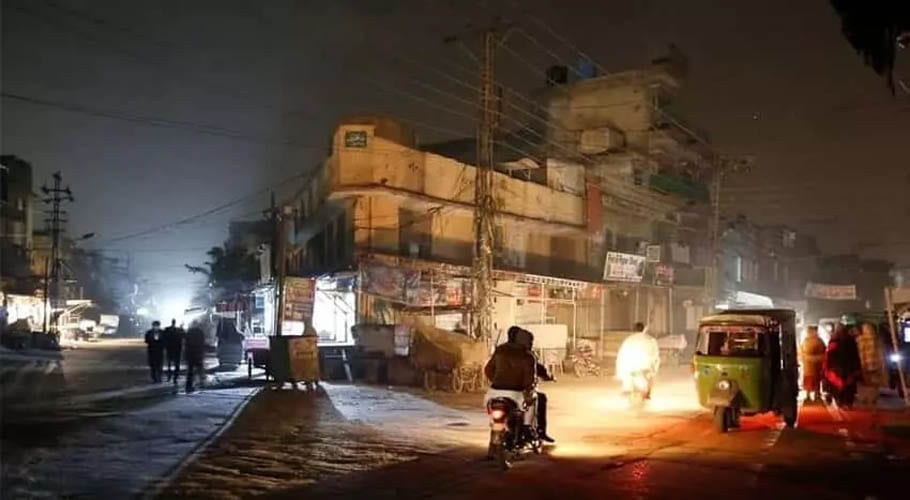Electric supply was restored fully or partially on Sunday in various cities, including Lahore Islamabad and Karachi, hours after several areas in the country plunged into darkness following a massive blackout due to a defect in the power distribution system.
The power outage was reported shortly before midnight approximately at the same time in various parts of the country. Residents of Islamabad, Rawalpindi, Lahore, Multan, Karachi, Sindh and other areas faced the blackout as with the Ministry of Energy blaming it on the previous government and a sudden drop in frequency that tripped the entire system.
In 2015 an apparent rebel attack on a key power line plunged around 80 percent of Pakistan into darkness. That blackout, one of the worst in Pakistan’s history, caused electricity to be cut in major cities nationwide.
Technical fault and blame game
The National Power Control Center (NPCC) has said that a technical fault in the system caused the major power breakdown in several parts of the country. The Ministry of Energy spokesperson said the fault caused the country’s high transmission lines to a trip, which in turn caused the system frequency to drop from 50 to 0 in less than a second. The drop in frequency caused power plants to shut down.
Phase-wise restoration of power will be initiated soon, once the initial frequency is met, the restoration work speeds up the said. Despite several claims, the ministry failed to restore the power supply to the affected areas.
Blame game
After nine hours, the Federal Minister for Power, Petroleum and Natural Resources Omar Ayub Khan has said that gradual restoration of the power supply is underway. He said that a fault occurred at Guddu power station at 2341 hrs, dropping the frequency to zero within a second and 10,302 MW were pulled out of the system.
While accusing past governments of ignoring transmission, he said faults occur due to out-date system as no effort was made in the past to upgrade transmission lines. During the tenure of PML-N, transmission lines were able to handle no more than 18500 MW.
Pakistan Tehreek-e-Insaf (PTI) government has increased the capacity to more than 23,000 MW, he added. The energy minister said The PTI government is spending over three hundred billion rupees to upgrade transmission systems for a smooth power supply.
Mismanagement in the power sector
Pakistan has the fifth largest river system in the world with an estimated generating capacity of 46,000 MW. We use only 14% of its production.
About 4,500 MW of electricity can be obtained from cheap hydroelectric power plants on the rivers of Punjab, but in the last 70 years, there has been widespread corruption. The energy crisis is emerging in the country due to corruption, mismanagement and lack of progress on development activities in the power sector.
In 1984, Pakistan generated about 59.3% of its electricity from hydroelectric power plants, which could have been used to generate more electricity, as it was the cheapest method. However, corrupt leaders have decided to set up expensive oil-fired plants for personal gain.
By 1990, hydropower consumption had dropped to 45 percent. Due to persistent corruption, the rate of hydropower generation has come down to only 29.3%, while the use of oil has reached 37.8% and the use of gas has reached 30%. Instead of reopening the shutting down and building reservoirs, it was postponed and replaced with oil-fired power plants, which pushed electricity prices to a record high.
Load shedding issue
Load shedding has become a practice during summer but nowadays people across the country also face this at every level. Load-shedding in multiple areas of the city has increased to over 13 hours a day in summer. The prolonged and unannounced load-shedding has also led to water shortages in different areas of the country.
Authorities should take serious notice of load-shedding particularly in a fragile situation caused by the COVID-19 pandemic.
Govts should flat-out efforts to counter the issue
The provincial and the federal governments are busy scoring political points by holding responsible for each other load shedding; both governments should take solid steps to address the issue. The prevailing political situation will only create conflict and will become a huge hindrance in the way of progress.
Rather than humiliating each other, political parties should really be working together to fix the issues and only by mutual cooperation can we lead our country in harmony. The governments and the national institutions within their available resources should make flat-out efforts to counter the issues as soon as possible.
The solution to the problem is clear: first of all, the secret agreement between the government and private companies of power supply should be an end. Later, the government should take over the whole power system with strict monitoring instead of handing it over to a new company.




































